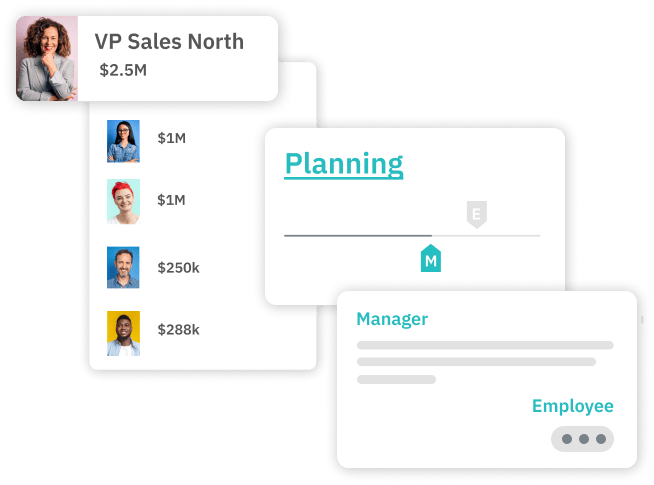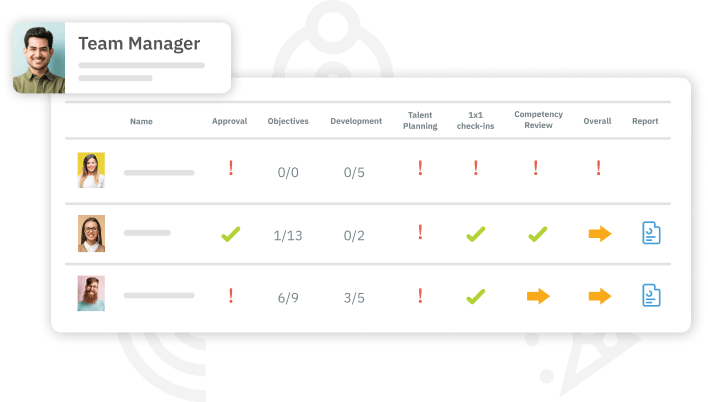Performance Management Software
Ongoing feedback, continuous growth
Turn periodic performance reviews into an ongoing conversation that generates constructive feedback and meaningful, measurable improvement throughout the year.

Performance Management Software
Performance management software is used to track and measure employee performance. It helps establish goals, improve communication between staff members, develop talent, and provide feedback in a simple and efficient way. Through the use of employee performance management software, companies can easily evaluate their employees’ contributions over time and take action accordingly. The best software provides detailed analytics, custom reports, and real-time notifications to ensure that organizations can monitor their staff’s performance and make informed decisions. Performance management is a valuable process for businesses of all sizes to track employee progress and improvement.
TalentGuard's Performance Management System
TalentGuard’s Performance management system plays a crucial role in driving business performance, providing employees with a clear understanding of their roles and objectives and how their contribution aligns with organizational priorities. By continuously monitoring and assessing employees’ performance and progress, TalentGuard helps businesses identify skill gaps and opportunities for improvement, which ultimately leads to enhanced productivity, efficiency, and profitability. An effective performance management system also help employees reach their potential by providing them with meaningful feedback, coaching, and development opportunities based on their individual skills, strengths, and weaknesses. Investing in software can not only improve business performance but also increase employee retention and satisfaction as they have a clear path for career growth within the organization.
Performance Management Applications to Measure Employee Progress
The TalentGuard Performance module offers various customizable panels to evaluate and manage employee performance comprehensively.
The Behaviors Assessment Panel allows organizations to assess employee values, behavioral expectations, and cultural alignment through tailored questions and rating options.
The Cascading Objectives/Goals Panel aligns individual targets with organizational objectives, tracking deliverables from corporate goals to individual contributors, ensuring consistency and alignment across all levels.
The Core Responsibilities Panel facilitates job skill assessments tied to predefined and approved job profiles, providing clarity on performance expectations.
The Operational Portfolio Panel serves as a journal for documenting corrective actions or accomplishments, enhancing performance tracking and accountability.
Lastly, the Interim Review Panel supports mid-year performance evaluations, enabling organizations to monitor progress on objectives and adjust goals as necessary.
Performance Management Best Practices
Performance management is a critical process for aligning organizational goals with employee performance while fostering continuous growth and engagement. By implementing best practices, organizations can ensure a consistent and effective approach to managing talent. TalentGuard’s Performance Management Software is a cloud solution that enables companies to:
Set Clear Objectives: Begin with well-defined organizational goals that cascade down to individual objectives. Use the SMART (Specific, Measurable, Achievable, Relevant, Time-bound) framework to ensure clarity and alignment. Employees who understand their role in achieving company goals are more likely to stay motivated and focused.
Continuous Feedback: Move beyond annual performance reviews by adopting a culture of regular feedback. Frequent check-ins allow managers to address issues promptly, provide coaching, and recognize achievements in real time.
Behavioral and Skill Assessments: Incorporate tools to evaluate both job-specific skills and behavioral competencies. Assessments should align with company values and cultural expectations, ensuring employees are not only competent but also aligned with the organization’s mission.
Track Progress: Utilize technology to monitor performance data and maintain transparency. Digital platforms can provide dashboards for tracking objectives, accomplishments, and areas for improvement. This enables both managers and employees to stay informed about performance trends.
Development Plans: Focus on employee growth through personalized development plans. Identify skill gaps and provide resources such as training, mentoring, and learning opportunities to help employees achieve their goals.
Recognize Achievements: Regularly acknowledge and reward employees for their contributions. Recognition fosters engagement, loyalty, and a positive workplace culture.
Consistency and Fairness: Standardize evaluation processes to ensure equity and fairness. Clearly define criteria for assessments, and train managers to minimize bias in evaluations.
By integrating these best practices, organizations can enhance employee engagement, optimize performance, and achieve strategic goals more effectively while building a supportive and high-performing workplace culture.
To learn more about TalentGuard’s Workforce Intelligence Platform or to schedule a demo of our Performance Management software, please request a demo.

Real-time feedback for better learning
Performance feedback is most powerful when it happens in real time, whether it’s constructive criticism or recognition for a job well done. The performance review can be transparent between manager and employee or employee-only, or manager-only.

Multi-faceted reviews
Combine reviews of culture, soft skills, job skills, and organizational goals into one streamlined performance review. Utilize BARS or Likert scales to customize to your organizational needs.

Org-wide goal alignment
Keep everyone working towards the targets that matter by setting company or departmental goals and assigning them directly to employees.
Choose Your Starting Point
All three options strengthen clarity across skills, readiness, and talent risk.
The difference is where you start—diagnosing trust, building the foundation, or seeing decisions in action.
Automate
Competency management for HR with AI automation. Create AI-powered skills, jobs, and career paths, building a strong talent management foundation.
Automate includes:
- WorkforceGPT Copilot powered by Generative AI
- Talent Frameworks: Access to industry-specific pre-built competency models
- Content Management System: Ability to create, edit, manage and map skills, jobs, learning and career progressions.
- Workflow and Approvals Automation
Engage
Enhance employee engagement and retention with impactful strategies that ensure optimal return on investment.
Everything in Automate plus:
- Talent Assessment: Assess employee skills and competencies
- Development Plan: Develop personalized learning paths
- Career Path: Advance employees with recommend career paths
- Analytics: Workforce intelligence insights and reporting
Optimize
Build a robust enterprise foundation to manage and optimize your mission-critical talent management program at scale.
Everything in Engage plus:
- Succession Planning: Build high-potential talent pools
- Performance Management: Review, set goals, & provide feedback
- Certification Tracking: Track employee certifications
- 360 Feedback: Conduct multi-rater leadership feedback
Trusted by Leading Companies Worldwide




